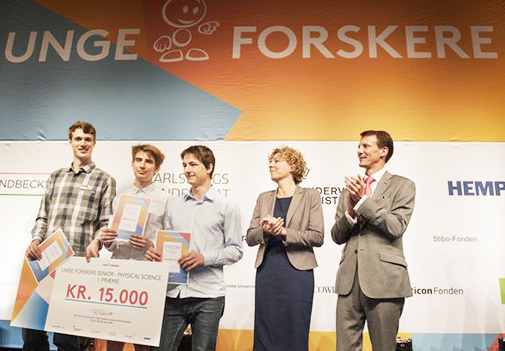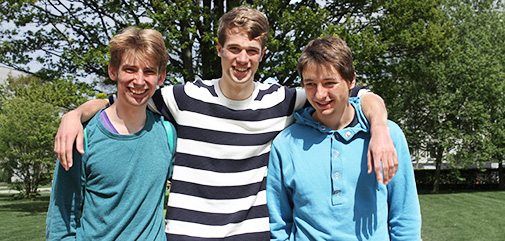Pascal's triangle and 100 caramels
Three first-year mathematics students chose to follow a second-year course - and submit the course mandatory project for the talent competition Young Scientists. It gave them a first prize, a trip to China and much glory.

The 1st prize in Young Scientists Senior category Physical Science, was presented by HRH Prince Joachim and Minister of Education Christine Antorini – 29 April 2014. Photographer: Sanne Vils Axelsen.
Peter Michael Reichstein Rasmussen, Frederik Ravn Klausen and Sebastian Tim Holdum, followed Søren Eilers’ course "Discrete Mathematics 2" and chose to formulate a topic for the course mandatory project. The project title was "On the power of prime divisors in the central binomial coefficient”.
"Their project was of course approved, but their work was so impressive that it not only held out for a first prize in the talent competition Young Scientists, but it is - according to an expert in the field from Dartmouth University - also publishing worthy," says Søren Eilers.
Most participants in the Young Scientists senior department are high school students, but anyone can join as long as they are under 21 years of age.
A communication challenge
In a competition where many of the participants bring experimental set-ups, prototypes of inventions or colorful posters, it is not easy to be a mathematician. And it was hard work to present the project to the inquisitive school children.
"It was quite a challenge because our project is not very visually. And we were often asked ‘What can it be used for?’” says Frederik.
"We used Pascal's triangle to explain the project. And we had brought a lot of caramels. The pupils were rather interested in the caramels! The idea was that you had to think about how many ways one can choose half of an amount. Like 100 caramels" says Peter.
Travel Grant to China
The three won 15,000 DKR and a trip to the China Adolescents Science and Technology Innovation Contest (CASTIC) - taking place in Talyuan City, Shanzi province from 26 to 31 July 2014.
"We will be guests of the Chinese finale and participate in a small competition among the international guests. So we have to translate our poster to English and Chinese. Hopefully there will also be time to see a little” says Frederik.
- Are you bringing caramels?
"Ha, no, I think it is better to buy some Chinese candy when we get there. Maybe they don’t like caramels?
The power of the prime divisors
For the mathematicians out there Søren Eilers explains:
"The question they addressed is whether one can be sure that either 4 or 9 goes up in the central binomial coefficient (2n)!/(n!)^2 when n is not in {1,2,3,4,64,256}. It is known that the data is never square-free."
We hope to bring more of the trio's participation in the Chinese competition this summer.

Sebastian Tim Holdum, Peter Michael Reichstein Rasmussen and Frederik Ravn Klausen.
